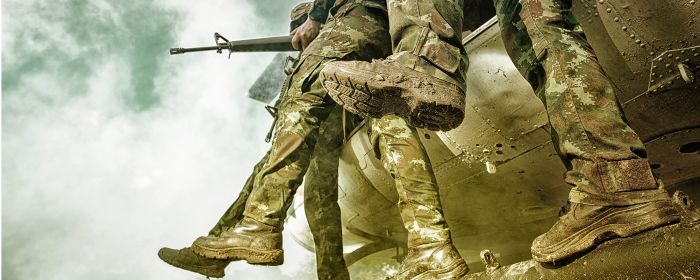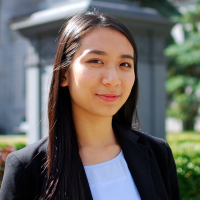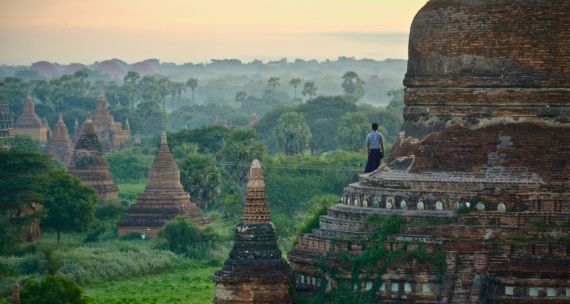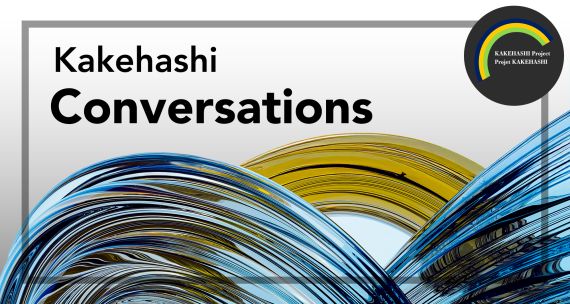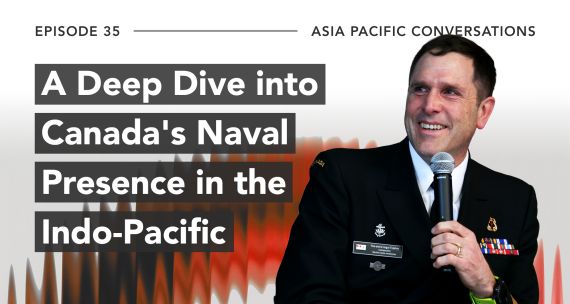LISTEN NOW: Asia Watch: Beyond the Headlines
APF Canada President & CEO Stewart Beck in conversation with author and analyst Julia Nguyen on the story behind the story of the coup in Myanmar.
In the early hours of Monday, February 1, Myanmar’s military seized power in a coup d’état. State Councillor and de facto leader Aung Sang Suu Kyi, along with prominent members of the ruling National League of Democracy (NLD), activists, and leaders of several regional and ethnic parties, were all detained following a series of dramatic morning raids. Local phone lines and internet access were temporarily cut to deliberately hinder communication.
The military, also known as the tatmadaw, has declared a one-year state of emergency and announced a list of new officials to replace the NLD-led government. With few exceptions, international and domestic flights were strictly limited.
The coup came mere hours before a new parliamentary session was due to start following the NLD’s landslide victory in last November’s general election. For months, the tatmadaw has alleged widespread election fraud, a claim dismissed by both the country’s Union Election Commission (UEC) and independent observers.
It is becoming increasingly clear that the military takeover had little to do with electoral integrity. Instead, all signs point to the fact that the move was carefully timed and orchestrated. But why now?
Democracy no more as military retakes control
Monday’s events put a sudden halt to Myanmar’s fragile push towards democracy. However, it is important to note that this “democratic transition” was initiated by the junta in 2011, when it introduced a series of wide-ranging political and economic reforms.
The military never intended to fully relinquish its power when it transitioned to a quasi-civilian civilian government in 2011. Under Myanmar’s 2008 Constitution, which was written by the military that same year, a quarter of the seats in parliament and three powerful ministries are guaranteed to the tatmadaw. The Constitution also bars Aung San Suu Kyi from becoming president. Simply put, the junta created a system to ensure that it retains its power – even if a democratically-elected government takes office.
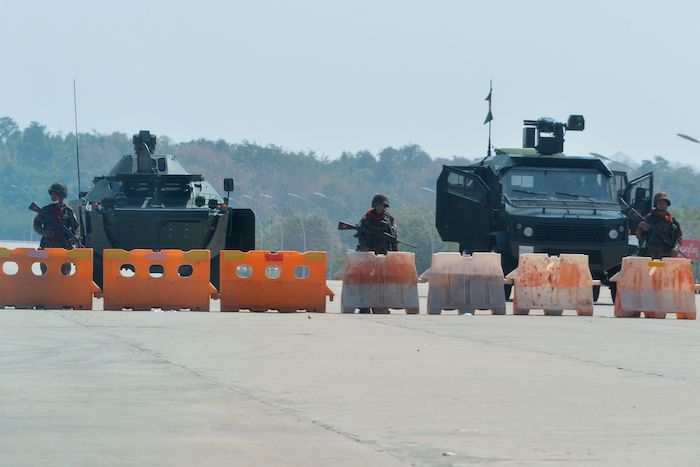
These enshrinements, however, have not stopped the domestically-revered pro-democracy icon and her party from securing resounding victories in the two democratic elections since the end of military rule – one in held in 2015 and the other in 2020. But beneath the surface of this nascent democracy, civilian-military tensions have continued to simmer against a backdrop of unabated ethnic armed conflict and human rights violations.
The uneasy detente reached a tipping point, however, when the tatmadaw realized that it was steadily losing its power and influence to a democratically-elected NLD, which indeed captured more than 80 per cent of total seats in the November 2020 election, dealing a humiliating blow to the military-backed Union Solidarity and Development Party (USDP).
The resounding defeat also dimmed any prospects of Commander-in-Chief of the Armed Forces, Min Aung Hlaing, securing a government position after his mandatory retirement this year. Many suspect that the senior general’s ambitions played a central role in this week’s coup.
Further, the fact that the tatmadaw evoked the very Constitution it created to justify its power grab demonstrates that it is capable and willing to assert its dominance when threatened, with little regard for democratic norms. As the military’s election-fraud allegations seemed not to have their intended effect, the tatmadaw likely felt it was running out of options in the lead up to a new government starting its next term.
The military’s dangerous gamble
While the tatmadaw has not made its intentions clear, many predict that a return to democratic governance is highly unlikely, even if the detained NLD members and other activists are gradually released. Although it promised to hold “free and fair elections” in a year, this may never happen, as the people would almost certainly and overwhelmingly re-elect Aung San Suu Kyi and the NLD. Indeed, the promise of future elections may merely be a tactic to appease international and domestic criticism and holds little weight.
What is, unfortunately, more likely is that the current situation could escalate into an outright violent conflict. In the weeks leading up to the coup, clashes intensified between the tatmadaw and the Karen National Liberation Army (KNLA), which has tried to resist the expansion of military operations within its territory since the start of December last year. In other parts of the country, such as Rakhine state, violent conflict never really stopped.
While the NLD government has disappointed many within and outside the country as a broker of peace, there was some significant hope that Aung San Suu Kyi’s robust electoral mandate would give her the political space to advance the peace process throughout troubled Myanmar. Now, the military may act unchecked in quelling unrest in ethnic areas. It is an ominous sign that Min Aung Hlaing himself has been accused by the United Nations’ Fact-Finding Mission in Myanmar of crimes against humanity and genocide against his country’s Rohingya Muslim minority.
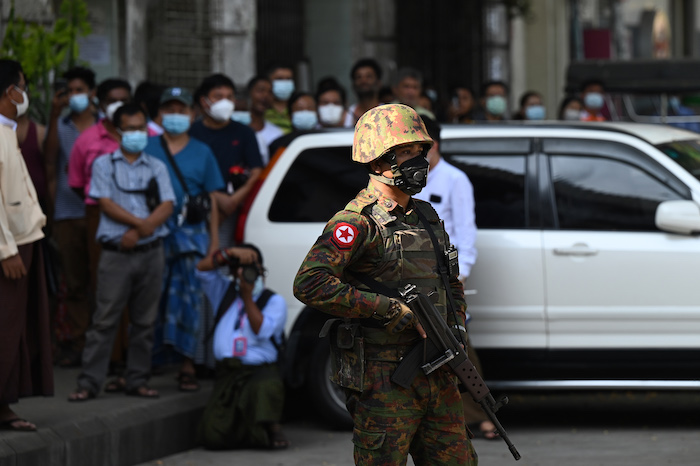
Somewhat ironically, a return to military rule also bodes ill for the country’s majority Bamar ethnic group, most of whom voted for the NLD. The day after the coup, health-care workers and a major youth activist group announced their intention to launch civil disobedience campaigns as early as Wednesday. Observers will be waiting and watching to see if others follow their lead, holding their breath waiting to see whether the tatmadaw responds with a velvet glove or an iron fist.
A test for the international community, and for Canada
The UN Security Council (UNSC) announced an emergency closed-door session today (February 2). The group is reportedly discussing a statement, drafted by the British, calling on the coup leaders to “immediately release those unlawfully detained.” Notably, the UN, including the Security Council, was sharply criticized in 2019 for its “systemic and structural failures” in responding effectively to the Myanmar military’s violence against the Rohingya. It is not clear, however, what leverage the UNSC would have in the current crisis. Russia and China, both regular bulwarks against UNSC action regarding countries’ internal political affairs, would almost certainly veto anything substantive.
China’s position, however, may not be so cut-and-dry. The China-Myanmar relationship is often portrayed as one that effectively shields Myanmar from Western criticism. But China has extensive business and infrastructure interests in the country and would be annoyed, to put it mildly, if coup-related unrest were to jeopardize those interests. Moreover, China generally has a positive relationship with Aung San Suu Kyi. The military, in contrast, has tended to be more allergic to the possibility of dependence on a foreign power, and thus more suspicious of China’s intentions.
Myanmar’s fellow members of the Association of Southeast Asian Nations (ASEAN) have issued largely predictable statements or non-statements, either urging the peaceful resolution of differences or noting that they do not comment on another state's internal affairs. It is worth pointing out, however, that Brunei, which recently assumed the one-year ASEAN chair, issued a statement saying: "We encourage the pursuance of dialogue, reconciliation and the return to normalcy in accordance with the will and interests of the people of Myanmar" (emphasis added).
For Canada, the alarming turn of events in Myanmar is of more than academic interest. Since 2017, Ottawa has made the plight of the Rohingya one of its more prominent foreign policy priorities. Part of its focus has been on alleviating the profound humanitarian crisis facing the more than one million Rohingya who have sought asylum in neighbouring Bangladesh. But Canada’s strategy also includes “encouraging positive political developments in Myanmar” and ensuring accountability for the crimes that have been committed against the Rohingya. In fact, Canada is a key player in the ongoing lawsuit at the International Court of Justice attempting to hold the tatmadaw accountable for alleged genocide and crimes against humanity. As mentioned above, the coup’s leader, Min Aung Hlaing, is believed to have been a central actor in those crimes.
Several Western governments will be weighing their sanctions options against Myanmar’s senior military leaders. While Canada eased some sanctions in 2012 as the political and human rights conditions improved, it kept in place some of those sanctions, and even added seven senior military officials to its sanctions list in 2018. Newly-elected US President Joe Biden has said his administration is considering re-imposing the sanctions that were mostly lifted over the past decade. But there is some skepticism that even targeted sanctions will have sufficient impact to persuade the generals to return the country to civilian rule. As one expert observed, the generals are motivated by power, not wealth. “Their friends and enemies are all within the country,” he said, adding that, “The rest of the world barely matters.”
A prolonged or indefinite period of harsh military rule may re-open an old fault line between Western democracies, which will be eager to push for democratization in Myanmar, and ASEAN states, which may revert to their long-standing non-interference principles. The permanent return of a military regime, ultimately, could complicate efforts by Canada and like-minded countries to develop a more engaged and productive relationship with the broader Southeast Asian region.
